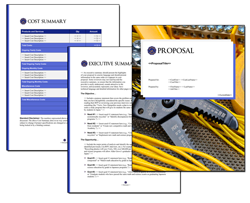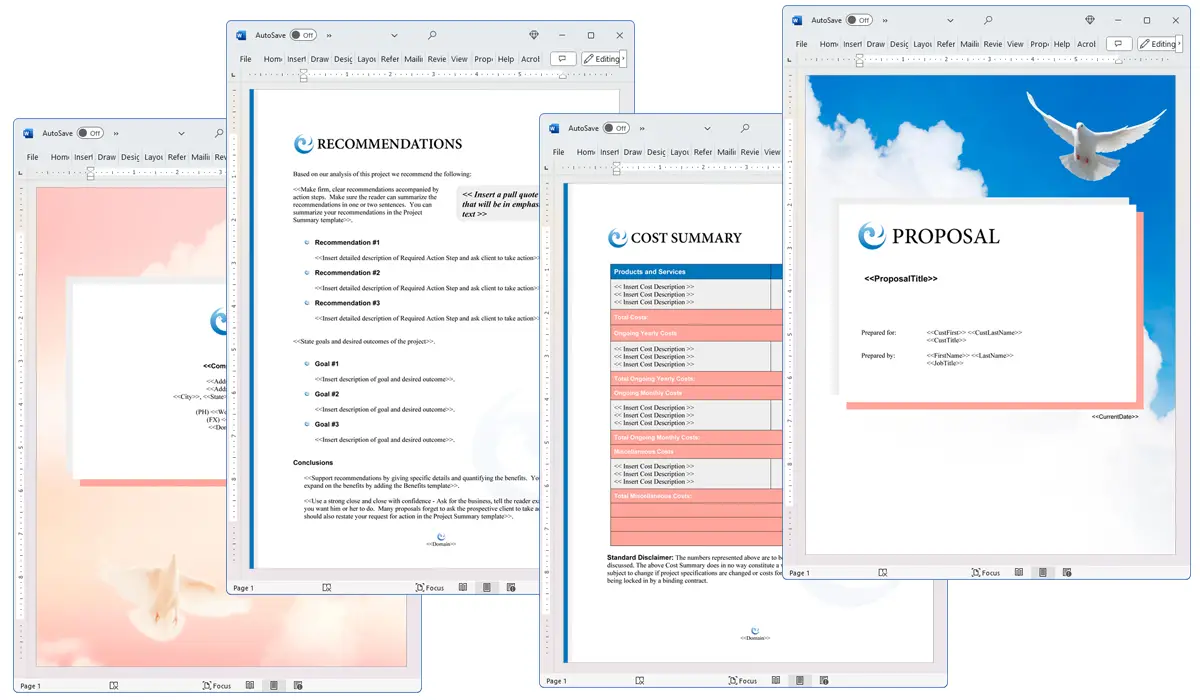What is the Environmental Impact chapter used for?
Proposal Kit Professional Bundle adds more design themes, all six Contract Packs,
a project management library, and Expert Edition software.

Illustration of Proposal Pack Classic #18
We include this Environmental Impact chapter template in every Proposal Pack, along with thousands more. You assemble this chapter with others in various combinations to create custom-tailored business proposals, plans, reports, and other documents. Proposal Packs apply custom visual designs to the templates, giving the final documents a consistent professional finish.
 DOWNLOADABLE, ONE-TIME COST, NO SUBSCRIPTION FEES
DOWNLOADABLE, ONE-TIME COST, NO SUBSCRIPTION FEES
Overview of the Environmental Impact Chapter
In the business world, particularly when dealing with projects that can have significant effects on the environment, it is crucial to address these potential impacts comprehensively. The Environmental Impact chapter is a vital part of a proposal document when engaging in projects related to industries such as mining, construction, and agriculture. This chapter helps businesses communicate how they plan to manage and mitigate environmental effects, which is important for gaining trust and approvals from stakeholders, regulatory bodies, and the community.
How is the Environmental Impact Chapter Used?
The Environmental Impact chapter is typically used in business proposals to outline the potential environmental effects of a proposed project. It serves to inform and assure stakeholders that the project will comply with environmental standards and laws. This chapter is integral in proposals submitted for projects that are likely to alter natural landscapes, use natural resources, or discharge wastes and emissions. By addressing environmental concerns proactively, companies can enhance their proposals' credibility and demonstrate corporate responsibility.
What is Included in the Environmental Impact Chapter?
This chapter typically includes several key elements:
- Description of the Project: A brief overview of what the project entails and its scope.
- Potential Environmental Impacts: Detailed analysis of the possible negative and positive environmental effects the project might have.
- Mitigation Strategies: Strategies and measures that will be implemented to prevent, reduce, or manage negative impacts.
- Regulatory Compliance: Information on how the project will adhere to local, national, and international environmental laws and regulations.
- Monitoring and Reporting: Plans for ongoing environmental monitoring and reporting procedures during and after the project implementation.
Use Case Examples for the Environmental Impact Chapter
The Environmental Impact chapter can be used in a variety of proposals across multiple industries, including:
- Environmental and Green Projects: Proposals for pollution reduction, renewable energy installations, and conservation programs.
- Nature and Wildlife Conservation: Initiatives aimed at preserving natural habitats and biodiversity.
- Construction and Contracting: Building projects that require land development and could disturb natural sites.
- Travel and Tourism: Developments in ecotourism that emphasize minimal environmental disruption.
- Energy and Resources: Projects involving the extraction and use of natural resources, such as oil drilling and coal mining.
- Farming and Agriculture: Agricultural activities that might affect land use, water resources, and local ecosystems.
- Ranching: Livestock production systems and their impact on land and water usage.
- General Information: Educational or awareness campaigns about environmental impacts related to various industries.
Key Takeaways
- Comprehensive Coverage: The Environmental Impact chapter is crucial for outlining the potential environmental effects of a project and the strategies to mitigate these impacts.
- Regulatory Compliance: It helps ensure that the project complies with all relevant environmental laws, which is vital for project approval.
- Stakeholder Assurance: This chapter plays a key role in gaining the trust of stakeholders and the community by demonstrating a commitment to environmental stewardship.
- Versatility: It is applicable in a wide range of industry proposals, from construction and energy to farming and tourism.
- Corporate Responsibility: Including this chapter highlights a company's dedication to sustainable practices and corporate responsibility.

Illustration of Proposal Pack Electrical #5
 What Our Clients Say
What Our Clients SayUseful for new proposal writers. Takes away the pain of having to repeatedly re-enter the same basic information into proposals. Valuable for someone new to proposal writing. Great how it automatically builds the proposal based on recommended sections to include or ones you choose. Takes a while to work out how it works but once you’ve done one it’s fine. Changing design and layout can be a challenge once the proposal is generated but this is really a Word problem. Really useful for someone wanting to take the leap into proposal writing."
 4.7 stars, based on 845 reviews
4.7 stars, based on 845 reviewsAlternate Chapters
Related Chapters
Document Layouts Using the Environmental Impact Chapter

The Environmental Impact chapter and other chapters are integrated into a Word document as illustrated here in the Proposal Pack Elegant #5 design theme. There are hundreds of design themes available, and every design theme includes the Environmental Impact chapter template.
A proper business proposal will include multiple chapters. This chapter is just one of many you can build into your proposal. We include the complete fill-in-the-blank template in our Proposal Pack template collections. We also include a library of sample proposals illustrating how companies in different industries, both large and small, have written proposals using our Proposal Packs. This template will show you how to write the Environmental Impact.
We include a chapter library for you to build from based on your needs. All proposals are different and have different needs and goals. Pick the chapters from our collection and organize them as needed for your proposal.
Using the Proposal Pack template library, you can create any business proposal, report, study, plan, or document.
 Ian Lauder has been helping businesses write their proposals and contracts for two decades. Ian is the owner and founder of Proposal Kit, one of the original sources of business proposal and contract software products started in 1997.
Ian Lauder has been helping businesses write their proposals and contracts for two decades. Ian is the owner and founder of Proposal Kit, one of the original sources of business proposal and contract software products started in 1997.By Ian Lauder
 Published by Proposal Kit, Inc.
Published by Proposal Kit, Inc.


 Cart
Cart
 Facebook
Facebook YouTube
YouTube X
X Search Site
Search Site